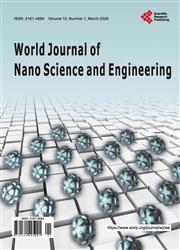The Effects of Annealing Process on Dielectric and Piezoelectric Properties of BMT-Base Lead-Free Ceramics
引用次数: 5
Abstract
By using nitric acid as the fuel, the lead-free ceramic of Ba(Ti1-x,Mgx)O3 (x = 0.31) was prepared by auto combustion method (ACM). To make a comparison, this ceramic was also prepared using mixed oxide method (MOM). By X-ray diffraction, the phase structures of two samples were studied, and the results showed that rising temperatures would reduce unwanted phases. The piezoelectric and electrical properties as a function of calcination and sintering temperatures were investigated. The results showed that the outstanding electrical properties were obtained for nanoceramic with this composition. The SEM image of the grain size was estimated around 2 micrometers, and the grain size increased with the increasing of sintering temperature for two samples. The curie temperature of the BMT-ACM was 126°C and it’s significantly larger than the curie temperature of BMT-MOM which was 118°C. The results of electrical properties emphasized that the synthesis optimum temperature for two samples was about 1200°C and it was the best temperature that led to improved properties such as dielectric constant, polarization and piezoelectric coefficients.退火工艺对bmt基无铅陶瓷介电和压电性能的影响
以硝酸为燃料,采用自燃烧法(ACM)制备了Ba(Ti1-x,Mgx)O3 (x = 0.31)无铅陶瓷。为了进行比较,还采用混合氧化物法制备了该陶瓷。通过x射线衍射研究了两种样品的相结构,结果表明温度升高会减少不需要的相。研究了煅烧温度和烧结温度对其压电性能和电学性能的影响。结果表明,该成分制备的纳米陶瓷具有优异的电学性能。SEM图像显示,两种样品的晶粒尺寸在2微米左右,晶粒尺寸随烧结温度的升高而增大。BMT-ACM的居里温度为126℃,明显高于BMT-MOM的118℃。电学性能分析结果表明,两种样品的最佳合成温度均在1200℃左右,该温度可提高材料的介电常数、极化系数和压电系数等性能。
本文章由计算机程序翻译,如有差异,请以英文原文为准。
求助全文
约1分钟内获得全文
求助全文

 求助内容:
求助内容: 应助结果提醒方式:
应助结果提醒方式:


